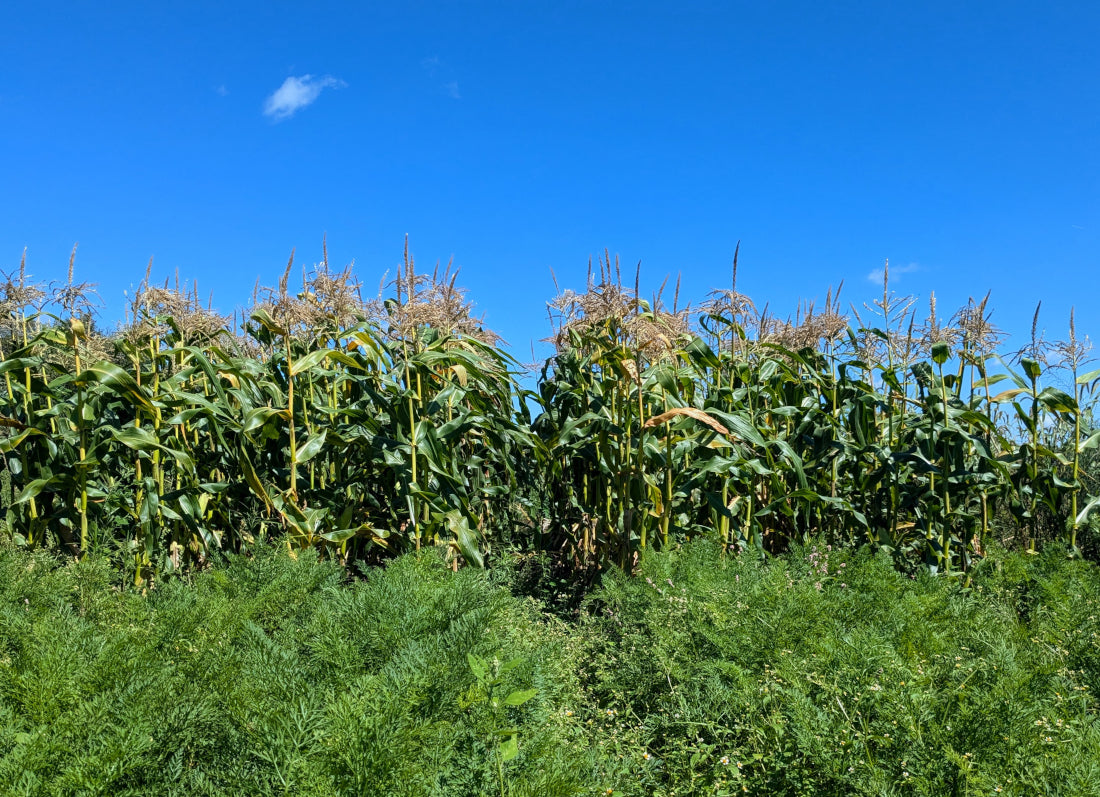Thinking about thoughts is tricky, and writing about thinking about thoughts is trickier still. There are endless very interesting discussions to be had about just what a thought is: completely immaterial, but nonetheless coherent; in one sense entirely subjective (my thoughts are never exactly yours) yet also clearly communicable (in describing a thought I may at least give you a near echo of what’s in my head); mostly useless or random, but also the thing that separates humans from all other species, gives rise to culture and arts and everything else. If that all sounds too heady, don’t worry. In this short post I’m only arguing that our thoughts are increasingly unmoored from the physical world. That may still sound like a wildly ambitious argument, but I aim to keep it light, breezy, and mostly agricultural. With that spadework out of the way, let’s get to it!
The first example I want to look at is soil carbon sequestration. I’ve written about this plenty of times, and it continues to get lots of mainstream press attention, because the idea is so appealing. Farm well, and the soil captures atmospheric carbon. Narrowly, this is true, in that organic matter is mostly carbon, so increasing the organic matter content of soil does capture carbon. But unlike coal or oil, which permanently lock carbon up, soil carbon is always in flux, dependent on things like rainfall as well as farming practices. If, fifty years from now, someone plows a field on my farm, organic matter will rapidly degrade, releasing all the carbon stored by my careful grazing.
As I’ve watched the conversation about soil carbon go on and on, I’m increasingly disturbed by how this fundamental point is glossed over. For a long time I assumed there was something I didn’t understand, some explanation that would square this crooked argument, but as the years have passed without it emerging I’ve come to think it is simply a combination of sloppy thinking and ignorance. It is possible to do math that shows a change in farming practices could sequester carbon, and so we pursue it, in spite of obvious flaws.
Or look at the discussion around cows and the environment, and the idea that the most expeditious course is for individuals to voluntarily eat less less beef. The biggest negative impact of agriculture is land use, specifically the clearing of the last great wildernesses in the world. The only approach that has any chance of stopping this is direct, which is to say, figuring out how to make both governments and individuals on the ground benefit more from preserving the Amazon than from destroying it. Not easy, by any stretch, but easier than changing the dietary preferences of the entire world.
What I find strange about both of these examples as well as several of my other hobbyhorses, like the dubious prospects of lab grown meat and vertical farming, is that the problems with them are not prosaic or difficult to understand. Seeing the flaws simply requires looking a few inches beyond the sheet of paper claiming to show how economies of scale and scientific breakthroughs will make it more efficient to grow plants in complex, automated warehouses under artificial light than in the dirt and sun, as plants have always grown.
No doubt the specific examples I’ve mentioned are easier for me to spot because of my familiarity with the workings of the food system. But I think they are also a reminder of the general principle that simple solutions to complex problems rarely pan out as promised, a principle we might usefully extend to claims that robot companions for the elderly and chatbots for the lonely can solve our social ills.
My bolder claim is that this willingness to put untold resources into solutions that have no chance of working is evidence of a troubling disconnect between ideas and reality. Anyone who has grown a veggie patch should be able to see the limited utility of vertical farming. Anyone who has a single good friend should be able to see how poor a substitute a chatbot would be. My fear is that as fewer of us plant gardens and fewer of us have friends we will lose our collective ability to spot a charlatan, that we will be unable to tell snake oil from panacea.
Or maybe I’m just overthinking the whole thing.


1 comment
I really enjoyed this article, it points out the obvious that is easily overlooked these days, I’m curious if most would agree with this rational and grounded line of thinking with the bombardment info these days and te confusion it can create with fear based misinformation.
I will say, I’ve been wanting to convert my backyard into a veg and fruit garden and within a year or so transition my small gardening business from caring for ornamentals into some model that is directly connected to community and growing healthy food, possibly purchase some land and offer as a community farm.
Im just at the idea and research stage but this article has really confirmed what I’ve been feeling lately, to
create something like community gardening post covd.
.
I wasn’t expecting to read something this inspiring while looking into buying meats from an independent farm, thank you for putting your thoughts out there for others to discover!